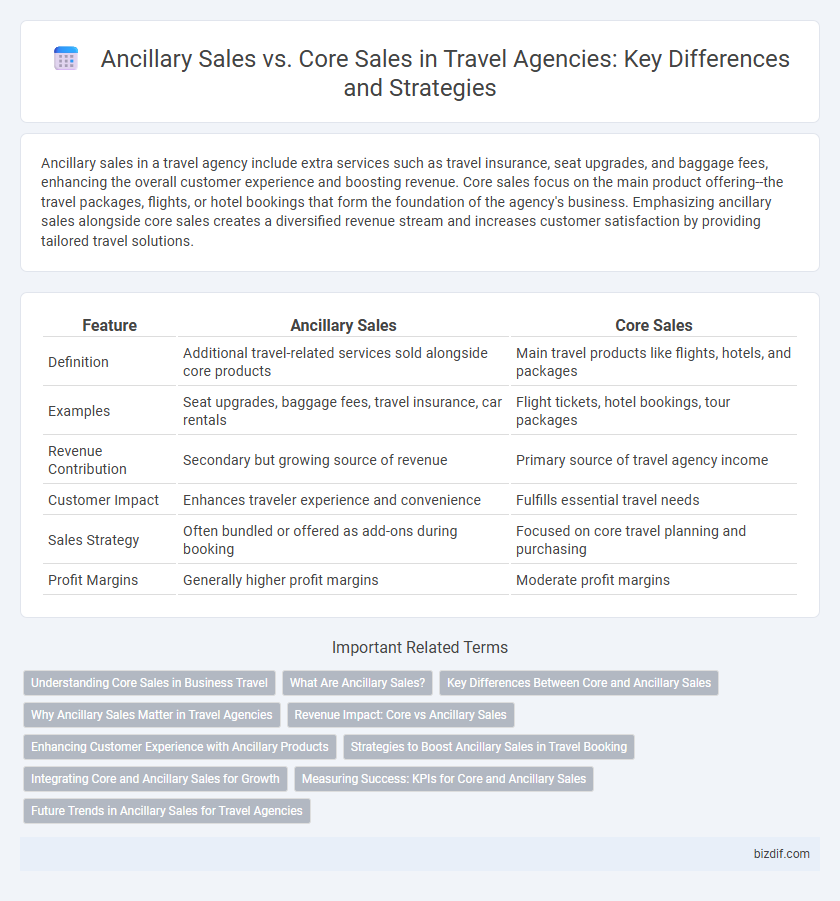Ancillary sales in a travel agency include extra services such as travel insurance, seat upgrades, and baggage fees, enhancing the overall customer experience and boosting revenue. Core sales focus on the main product offering--the travel packages, flights, or hotel bookings that form the foundation of the agency's business. Emphasizing ancillary sales alongside core sales creates a diversified revenue stream and increases customer satisfaction by providing tailored travel solutions.
Table of Comparison
| Feature | Ancillary Sales | Core Sales |
|---|---|---|
| Definition | Additional travel-related services sold alongside core products | Main travel products like flights, hotels, and packages |
| Examples | Seat upgrades, baggage fees, travel insurance, car rentals | Flight tickets, hotel bookings, tour packages |
| Revenue Contribution | Secondary but growing source of revenue | Primary source of travel agency income |
| Customer Impact | Enhances traveler experience and convenience | Fulfills essential travel needs |
| Sales Strategy | Often bundled or offered as add-ons during booking | Focused on core travel planning and purchasing |
| Profit Margins | Generally higher profit margins | Moderate profit margins |
Understanding Core Sales in Business Travel
Core sales in business travel primarily include the direct booking of flights, hotels, and car rentals essential for corporate trips, constituting the foundation of a travel agency's revenue. These transactions often involve negotiated corporate rates and contract agreements tailored to business clients' specific travel policies and preferences. Understanding core sales enables agencies to optimize service delivery, enhance client satisfaction, and build long-term partnerships in the competitive business travel market.
What Are Ancillary Sales?
Ancillary sales in the travel industry refer to the additional products and services sold alongside core travel packages, such as baggage fees, seat upgrades, travel insurance, and in-flight meals. These sales significantly boost revenue by enhancing the customer experience beyond the primary booking of flights, hotels, or tours. Focusing on ancillary sales allows travel agencies to diversify income streams and increase overall profitability without relying solely on core sales.
Key Differences Between Core and Ancillary Sales
Core sales for travel agencies primarily include primary products such as airline tickets, hotel bookings, and packaged tours, which constitute the main revenue stream. Ancillary sales encompass supplementary services like travel insurance, car rentals, and guided excursions that enhance customer experience and increase overall profitability. Key differences lie in their revenue impact, with core sales driving base income and ancillary sales offering high-margin opportunities to boost profit per customer.
Why Ancillary Sales Matter in Travel Agencies
Ancillary sales, including travel insurance, seat upgrades, and guided tours, significantly boost revenue streams beyond core sales like flights and hotel bookings. These additional offerings increase customer satisfaction by providing personalized and convenient options, enhancing the overall travel experience. Prioritizing ancillary sales enables travel agencies to build stronger customer relationships and improve profitability in a competitive market.
Revenue Impact: Core vs Ancillary Sales
Core sales in travel agencies, such as booking flights and hotels, generate the primary revenue stream, typically accounting for 70-85% of total income. Ancillary sales, including travel insurance, seat upgrades, and local tours, contribute significantly to profit margins by increasing average transaction value and customer lifetime value. Focusing on optimizing ancillary sales can boost overall revenue by 20-30%, leveraging cross-selling opportunities without proportional increases in operational costs.
Enhancing Customer Experience with Ancillary Products
Ancillary sales, such as travel insurance, priority boarding, and in-flight meals, complement core sales like flight tickets and hotel bookings by providing tailored options that enhance the overall customer experience. These additional products increase satisfaction by addressing specific traveler needs and preferences, resulting in higher engagement and loyalty. Integrating ancillary products effectively boosts revenue while creating a more personalized and seamless travel journey for clients.
Strategies to Boost Ancillary Sales in Travel Booking
Ancillary sales in travel booking, which include add-ons like baggage fees, seat selection, and in-flight meals, significantly increase revenue beyond core sales such as flight tickets and hotel bookings. Implementing targeted upselling strategies, personalized recommendations based on customer preferences, and seamless integration of ancillary options during the booking process can enhance customer satisfaction and boost ancillary revenue. Leveraging data analytics to identify high-conversion ancillary products and optimizing pricing models further strengthens ancillary sales performance in the competitive travel market.
Integrating Core and Ancillary Sales for Growth
Integrating core sales such as flight tickets, hotel bookings, and vacation packages with ancillary sales like travel insurance, guided tours, and car rentals enhances revenue streams and improves customer satisfaction. Leveraging data analytics to personalize ancillary offers based on core purchase behavior drives higher conversion rates and maximizes profit margins. Seamless integration of these sales channels within a travel agency's booking platform optimizes operational efficiency and strengthens competitive advantage.
Measuring Success: KPIs for Core and Ancillary Sales
Measuring success in a travel agency requires distinct KPIs for core and ancillary sales to optimize revenue streams effectively. Key metrics for core sales include booking conversion rates, average booking value, and customer retention rates, while ancillary sales performance is best tracked via attachment rate, upsell success rate, and incremental revenue per booking. Analyzing these KPIs separately enables targeted strategies that enhance overall profitability and customer experience.
Future Trends in Ancillary Sales for Travel Agencies
Future trends in ancillary sales for travel agencies emphasize personalized add-ons such as travel insurance, priority boarding, and local experience packages, driven by advanced data analytics and AI technologies. These enhancements not only increase revenue per booking but also improve customer satisfaction by tailoring offers to individual preferences and behaviors. Integrating seamless digital platforms that facilitate easy upsells during the booking process is becoming essential for maximizing ancillary sales growth.
Ancillary sales vs Core sales Infographic

 bizdif.com
bizdif.com